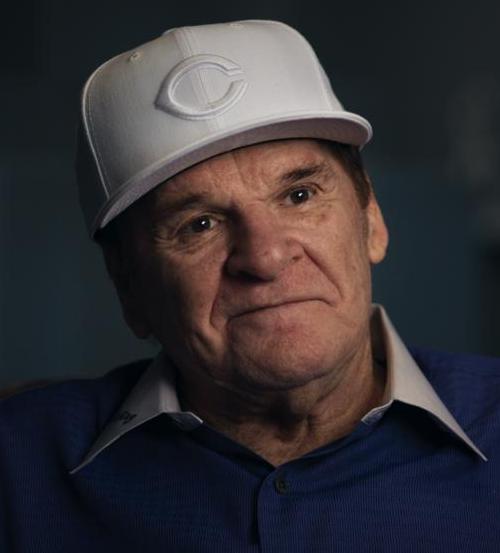Television Review
CHARLIE HUSTLE AND THE MATTER OF PETE ROSE
On HBO, Max
Pete Rose consistently lost thousands of dollars gambling on football and basketball and at the horse and dog tracks. Want to guess what he won big betting on?
Apparently Rose rarely whiffed betting on baseball, an irony that’s just one of countless fascinating details in the richly textured four-hour HBO documentary series “Charlie Hustle and the Matter of Pete Rose,’’ which premiered on Wednesday.
Filmmaker Mark Monroe celebrates Rose’s hard-nosed play and endless on-field exploits as well as his frequent acts of generosity; he also gets Rose to sit for extensive interviews. Credit Monroe for making Rose comfortable then confronting him on his gambling and his lies about gambling as well as accusations of statutory rape, the tax fraud that sent him to prison, and his association with drug dealers.
Rose does not seem sincere in his regrets and he’s often defensive and deflecting.
You also can’t call Rose’s responses “honest’’ given what one talking head calls his Trumpian relationship to the truth but they help form an entertaining and gripping look at a quintessential American figure.
There are a few easy quibbles with “Charlie Hustle.’’ It kicks off with an irrelevant segment with Rose talking football before the Cincinnati Bengals’ 2022 Super Bowl appearance. And it’s a bit long, redundant in making the case for both Rose’s greatness and his awfulness. On HBO it’s running in two two-hour blocks, but that exacerbates the flaws; I’d recommend watching on Max as four one-hour segments. Still, for any baseball fan, or anyone who loves a great character study, this program is a hit. (Seeing and hearing from Mike Schmidt, Al Michaels, Reggie Jackson, and others is an added bonus.)
The heart of the documentary — the “Matter’’ — is whether Rose can or should ever get inducted into baseball’s Hall of Fame, especially while he’s still alive. (Rose is now 83.)
Monroe lays out all the facts (and Rose’s fictions) without taking sides, leaving it to you to decide. You’ll probably change your mind multiple times as the details accrue.
The sections on his playing days make the case that he clearly belongs. Unlike “Shoeless’’ Joe Jackson, Rose never took gamblers’ payments to throw a game; unlike Barry Bonds or Roger Clemens, he never has been alleged to have cheated. (He argues that the Houston Astros players weren’t punished for cheating either.) He just hit. And hit. And hit. Across 24 years and 3,562 games the relentless Rose whacked 4,256 hits, breaking Ty Cobb’s record to great national celebrations in 1985.
The other thing Rose did was win. He was a crucial part of the Big Red Machine that won five division titles and reached four World Series in six years. (Red Sox fans can fast forward through the section on the 1975 World Series, slowing down only to watch Carlton Fisk’s Game 6 homer. But note that Rose was the MVP of that Fall Classic.) Then he went to Philadelphia and took the Phillies, a team that had never won, to their first title.
Still, there are plenty of marks against him. In addition to his accusations of statutory rape, his involvement with drug deals, and his tax fraud, he had a gambling addiction so bad that he once left the dugout — while managing — to watch the Kentucky Derby. The documentary makes clear that Rose’s ban and exclusion from the Hall comes back to betting on baseball.
Monroe portrays Rose as someone who cannot be believed about anything; by the time he’s talking about gambling, we know that he is the ultimate hustler in more ways than one. It’s not just that Rose publicly denied gambling on baseball for 15 years, it’s that he lies or embellishes nonstop. He twists the origins of his nickname, telling us a tale about how Whitey Ford and Mickey Mantle bestowed it on him as a compliment before Monroe reveals that the Yankees called him “Charlie Hustle’’ disdainfully. (Credit does go to Rose, of course, for turning it into a badge of honor.) He says, “I’ve never been in Gold’s Gym,’’ the site of a drug trafficking operation with which he was allegedly associated, then we see proof that he was.
The most devastating moment for Rose’s case is when Monroe notes that the MLB-commissioned Dowd Report, which detailed Rose’s gambling transgressions, said his betting on baseball started in 1984 or 1985. Rose shrugs it off, saying he doesn’t remember exactly, but if that’s what the report says, then it’s probably true. But Rose was still virtually an everyday player in those years, so he publicly contradicts his long-held stance that he only bet on games after he retired. While it’s difficult to imagine Rose throwing a game, the documentary also points out that to pay off his gambling debts he did supposedly finance cocaine deals. Where the bottom lies, no one knows.
I came away from the program back where I began: Rose should be banned from baseball itself — he should not have access to clubhouses or be allowed to work for any team — but the Hall of Fame is a separate entity. Despite his many, many flaws, he earned his plaque there and should be inducted before he dies.
At the very end Rose says he has just finally quit gambling in his 80s. “It took a long time for me to realize you can’t win,’’ he says. Too long, most likely, for him to give this story the ending he wants instead of the one he may deserve.


